Have you been thinking about getting help with your content marketing?
It makes sense! After all, your next marketing move may not be obvious. You may need some guidance to answer questions like:
- What content topics should we focus on?
- How much content should we publish and on which platforms?
- Is content marketing what we should be investing in?
- Where are our content gaps?
- Do we need more content for the customer journey?
- How is our content performing compared to the competition?
Whatever your questions may be, there are a few things that you can do before hiring a content marketing consultant. These things prepare you for working with a specialist. Plus, you’ll gain a better sense of whether it’s the right time for content marketing help.
Let’s dive in!
1) Develop Good Messaging
Do you know why people hire you? That seems like a silly question, but sometimes it is tough to hone in on the real reasons why customers hire you or your business.
Understanding your customers’ perceptions about your offers is an important part of “messaging.” Messaging is a fancy way of referring to how you communicate the value of your service.
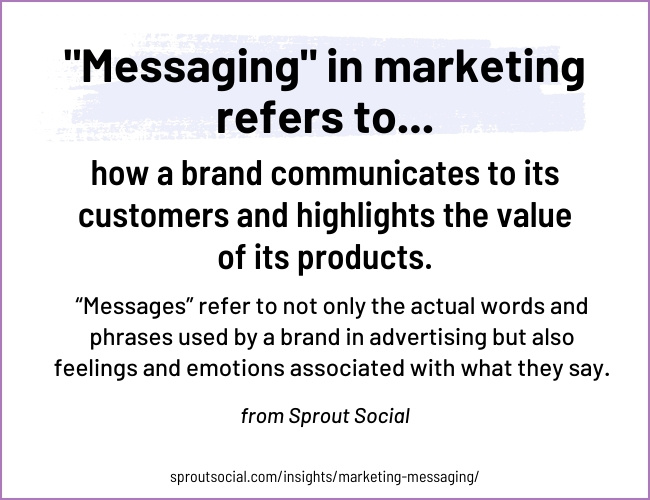
If you don’t know the value you bring to the table, then it won’t be clear to your prospects either. You can’t communicate something you don’t understand or know. That’s why messaging matters.
So, before you hire a content marketing consultant, get a good grasp of what you offer and the value of it to your customers. In other words, identify your value proposition.
For example, I sell content calendars that help clients save time, plan ahead, and reduce the stress of content marketing management.
But what I really sell is clarity, profitable marketing, and productivity. My clients know what to do next to generate leads through their content creation efforts rather than wasting time. That provides them with a sense of relief and a specific direction. And, they can better plan their time and their team’s time, which saves money.
Understanding your value proposition can be a challenge! Make a list of the benefits your customers receive or achieve from using your services. Dig deep to connect with the emotional reasons that are behind why customers hire your business.
After you determine a value proposition, incorporate it throughout your website. Update your messaging, especially on the homepage.
This step improves your lead generation by attracting more qualified leads. And, it helps a marketing consultant to create a more effective content strategy for your business.
For more help, check out our podcast episode on homepage messaging.
2) Identify an Avatar or Target Audience
Some marketers believe that it’s not necessary to pinpoint a picture of your ideal customer or “avatar.” While I do agree to some extent, I also feel that understanding WHO you’re trying to attract to your business matters. It makes a difference in your messaging and in your content marketing.
For example, the target audience of a spray tan facility in a Florida retirement community is likely women over 50. Women in this demographic may use spray tan for reasons other than to get that “healthy glow.” The tan helps to cover varicose veins, cellulite, and thinning, aging skin.
Think of the marketing advantage the facility would have by knowing these things! The content can be tailored for the needs, concerns, and feelings of a woman over 50 versus an 18 year old (or even a 50+ man!). So, this is a good example of how demographics like geographical location, age, and gender can make a difference.
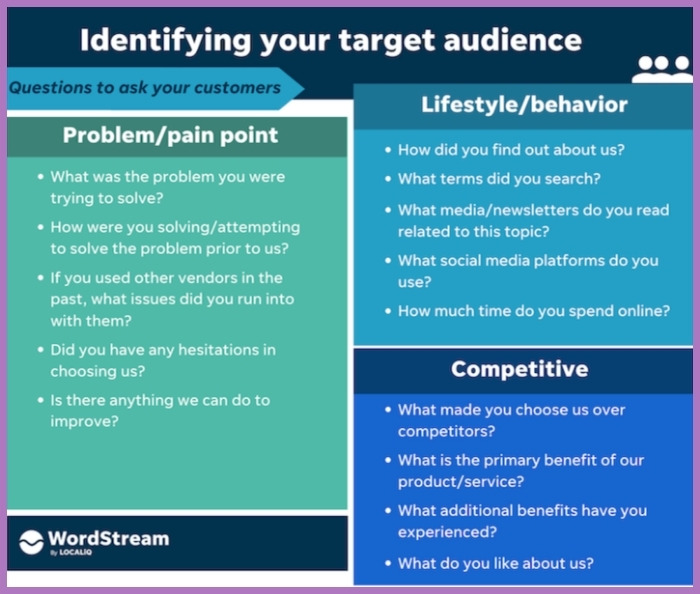
Do you have to construct an avatar to market your business? No. However, it will make your marketing more effective to identify a target audience. Trying to attract too many different types of customers makes it more difficult to create content that generates qualified leads.
Here’s another example. If you’re marketing your coaching services to a 22 year old recent college graduate and an experienced corporate executive, you will struggle. Those are two very different people at different stages in their lives. They have different concerns, desires, values, expertise, and experiences. Imagine trying to speak to both of them in your messaging and content!
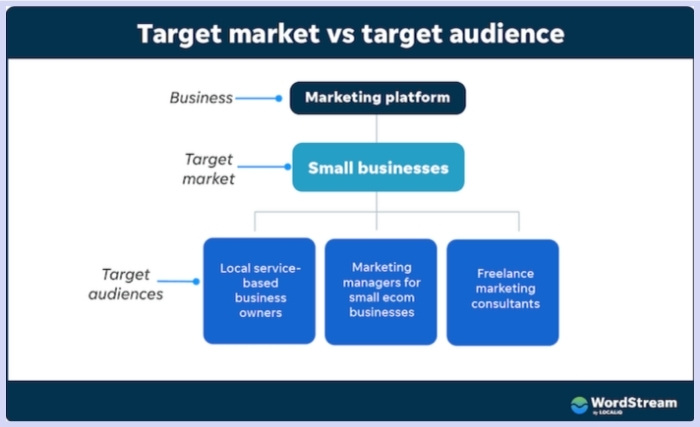
By the way, identifying a target audience before hiring a content marketing consultant is important since WHO you’re trying to attract and convert into a customer impacts content strategy and direction.
Need help with your avatar? Check out this podcast episode:
3) Assess Available Resources
Once you’ve established a clear cut message and target audience, it’s time to review your resources. Think about whether you have the time, money, people, and infrastructure/tools available.
This is about being practical. You must determine if you’re financially and physically capable of content marketing. Do you have the time and money to embark on content strategy, production, and management?
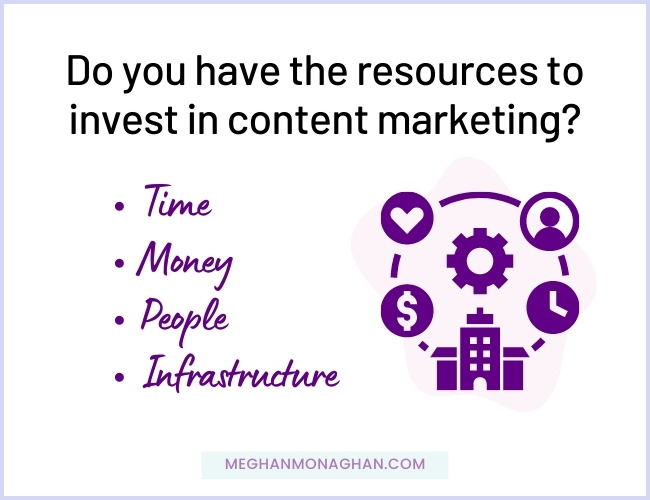
Be honest with yourself. Consider who is doing (or will be doing) the regular, weekly content marketing tasks. And, think about who is or will be managing it all. Also, determine what money is in the budget to hire help (including a consultant).
Your budget and resources will direct your next steps, which is why you need to assess them before hiring a content marketing consultant.
If you don’t have the funds to invest in content marketing or in consulting, then don’t waste your precious time pursuing it right now. It’s okay. Content marketing isn’t for all businesses.
Revisit it all when there are more available resources.
4) Review the Timeline and Business Needs
Another consideration before hiring a content marketing consultant is to review your timeline and your business needs.
- What are you trying to accomplish with content marketing?
- How soon do you need or expect results?
Your business requirements and deadlines help to determine which marketing strategies and tactics to use. Make sure to outline your business goals AND your content marketing goals. Associate specific outcomes with each goal so that you guide your efforts and can measure your content marketing’s effectiveness.
Content marketing is effective for longer term goals, such as lead generation, since it takes more time. Think of content marketing more as a tool to develop relationships with your audience. It’s a path to attracting prospects and building trust with them, which is not a quick process.
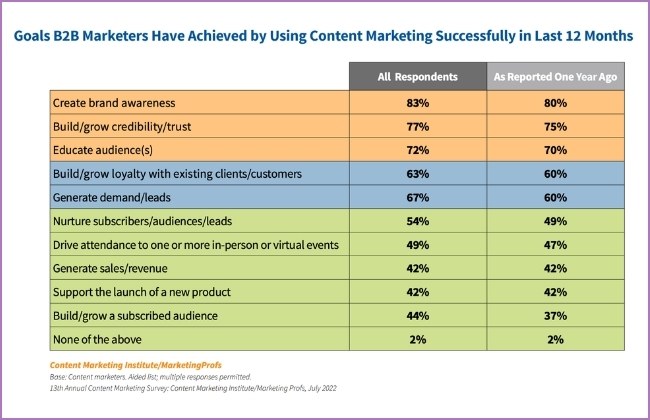
If you need to generate leads or sales in a short time, then you may want to explore other options first. For instance, you may need leads to support an upcoming launch in a few weeks. In scenarios where time is short, consider advertising, influencer campaigns, or collaborations as options.
This doesn’t mean you should abandon consulting a content marketing professional. Your assessment may prove that content marketing is of interest for the long term but not right now. Or, you may need a consultation to help you to decide what your business needs are and what your next marketing steps should be.
The point is to assess your needs first so you’re prepared for a discussion with a consultant. Spend the time to identify your short term and long term business goals. A consultant can be of more value to you when you better understand what you’re looking to accomplish and your time frame.
5) Evaluate Your Attitude
Finally, before you hire a content marketing consultant, examine the attitudes and beliefs you or your management have about getting advice and guidance.
- Will feedback be welcomed?
- Are new ideas and suggestions for improvement going to be received well?
- Is anyone so close to the work that they feel that they know what’s best?
Content marketing consultants offer constructive critiques of existing content strategies and tactics as well as suggest advice and new ideas. It’s their role to assess and provide guidance, which often includes pointing out what’s working—and what’s not.
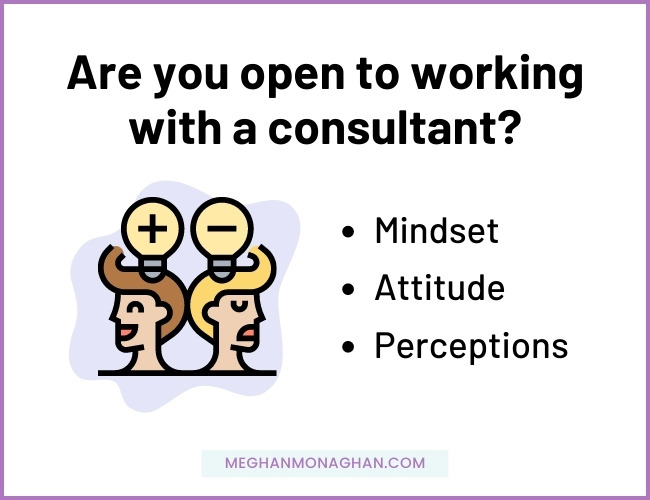
So, evaluate if you think that you’re ready for this type of interaction. If you or your team aren’t open to change or feedback, then you may want to pause on getting outside help.
Just remember, you don’t have to take the advice of a consultant. You’re hiring an expert to look at your business from an outside perspective with the goal of improving your results. It’s a positive thing! A negative attitude and mindset means that you won’t end up getting your money’s worth because you’ll not respect the process or the consultant’s expertise.
If You Do One Thing Before Hiring a Content Marketing Consultant, It’s This
Overall, there’s one thing that I can say after meeting with potential clients over the past 20 years: get your ducks in a row. In other words, spend the time figuring out the foundational building blocks of your business to support your marketing. (And if you need help getting those ducks aligned, that’s okay…get help!)
The more you know about your business, the more a consultant can help you. The less you know, the more guessing will take place. Sometimes guesswork is inevitable. But, the farther away from the center of the target, the longer it will take to hit it. 😉
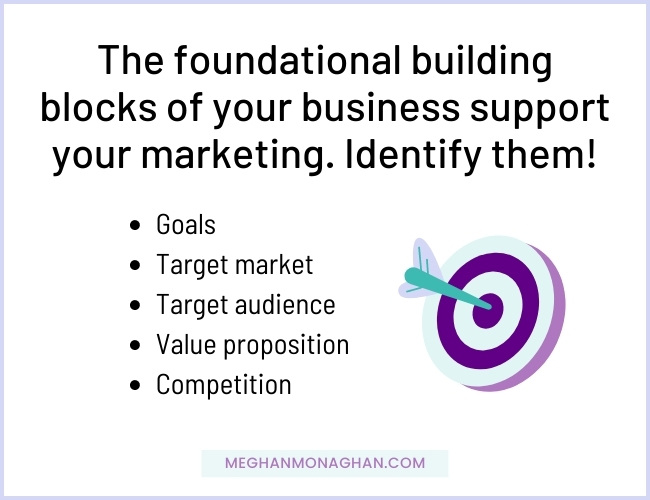
So, it really helps to know certain things about your business before meeting with a content marketing consultant, such as:
- Goals
- Target audience
- Value proposition
- Competition
These are business basics!
While it’s true that you’re hiring a consultant to give you business advice, you must understand who your customer is and what your business offers. That’s your area of expertise, not the consultant’s.
Although there are plenty of benefits of working with a content marketing consultant or coach, you may want to spend a little time contemplating your business basics first. Why? Because those foundational building blocks drive your content strategy, creation, and promotion.
But, if you are struggling with the basics, no worries! Be upfront about it when you’re meeting with potential marketing consultants, and ask if they can help with this too (as well as with your content marketing).
If you’re a small business that wants to achieve profitable content marketing, let’s chat!
